-
 Published: Sep 7, 2023
Published: Sep 7, 2023
-
 10 min. read
10 min. read
-
 Savannah Swanson
Savannah Swanson Digital & Social Trends Writer
Digital & Social Trends Writer
- Savannah is a content marketer with editorial experience spanning several businesses. Specializing in social media and marketing trends, she loves talking about the latest developments in online marketing. When she’s not writing, Savannah loves traveling, hoarding books and coffee mugs, and adoring her cat. Please don’t ask her about famous true crime cases, or else she’ll tell you all about her theories and get absolutely no work done.
Methodology
We asked 500+ business executives and leaders how they plan on doing digital marketing in 2024. Learn what they revealed — from budgeting to campaign goals (and more). Plus, get applicable insights from WebFX Sr. leaders!
Did you know digital advertising spending is expected to reach over $695 billion in 2024? But with so many digital channels to invest in, where exactly are business leaders investing that money, and what are their top goals?
Keep reading to get the inside scoop on:
- Top digital marketing channels for 2024
- Monthly digital marketing budget
- 2024 vs. 2023 digital marketing investment
- 2024 digital marketing provider choice
- Digital marketing goals for 2024
- Digital marketing ROI tracking
- Martech stack adoption
Key Insights
- 77% of business leaders plan to invest more than $500 per month in digital marketing
- 58% of business leaders have or plan to implement a martech stack in 2024
- 53% of business leaders plan to invest more money in digital marketing in 2024
- 42% of business leaders plan to prioritize paid search marketing channels in 2024
- 41% of business leaders plan to outsource digital marketing in 2024
2024 digital marketing investment
Digital marketing is more than just shouting your business’s name from the rooftops of the Internet in hopes that new customers will hear you. Digital marketing is a vast world of different strategies, channels, and platforms that are all used to help further your brand’s image and get the word out there about what you have to offer.
But it’s not necessary for businesses to use every platform out there — sometimes you just need to invest in a select few strategies to elevate your brand.
Top channels by spend
We wanted to get to know our respondents a bit more by understanding which digital marketing channels they’re prioritizing for their 2024 digital marketing strategy.
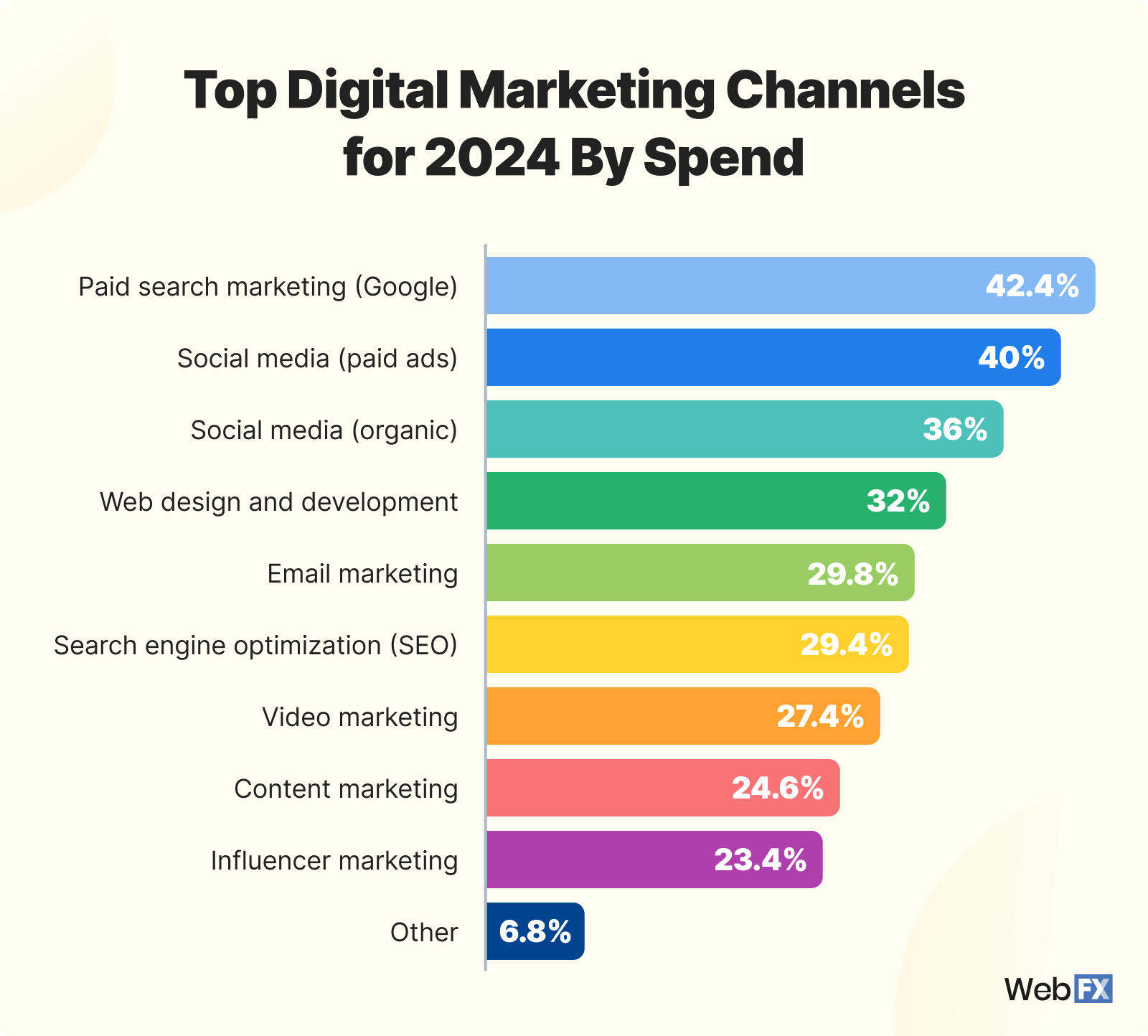
What does this mean?
Interestingly, our respondents’ top digital marketing channels for 2024 were spread out relatively evenly across the board, with top channels including paid search marketing and both paid and organic social media.
So, if you were hoping for a clear winner here to help you guide your own digital marketing investment decisions, you won’t find it in this data. You will, however, find it with WebFX’s VP of Business Development, Trevin Shirey.
When choosing the right channels for your 2024 digital marketing strategy, keep this advice from Trevin in mind:
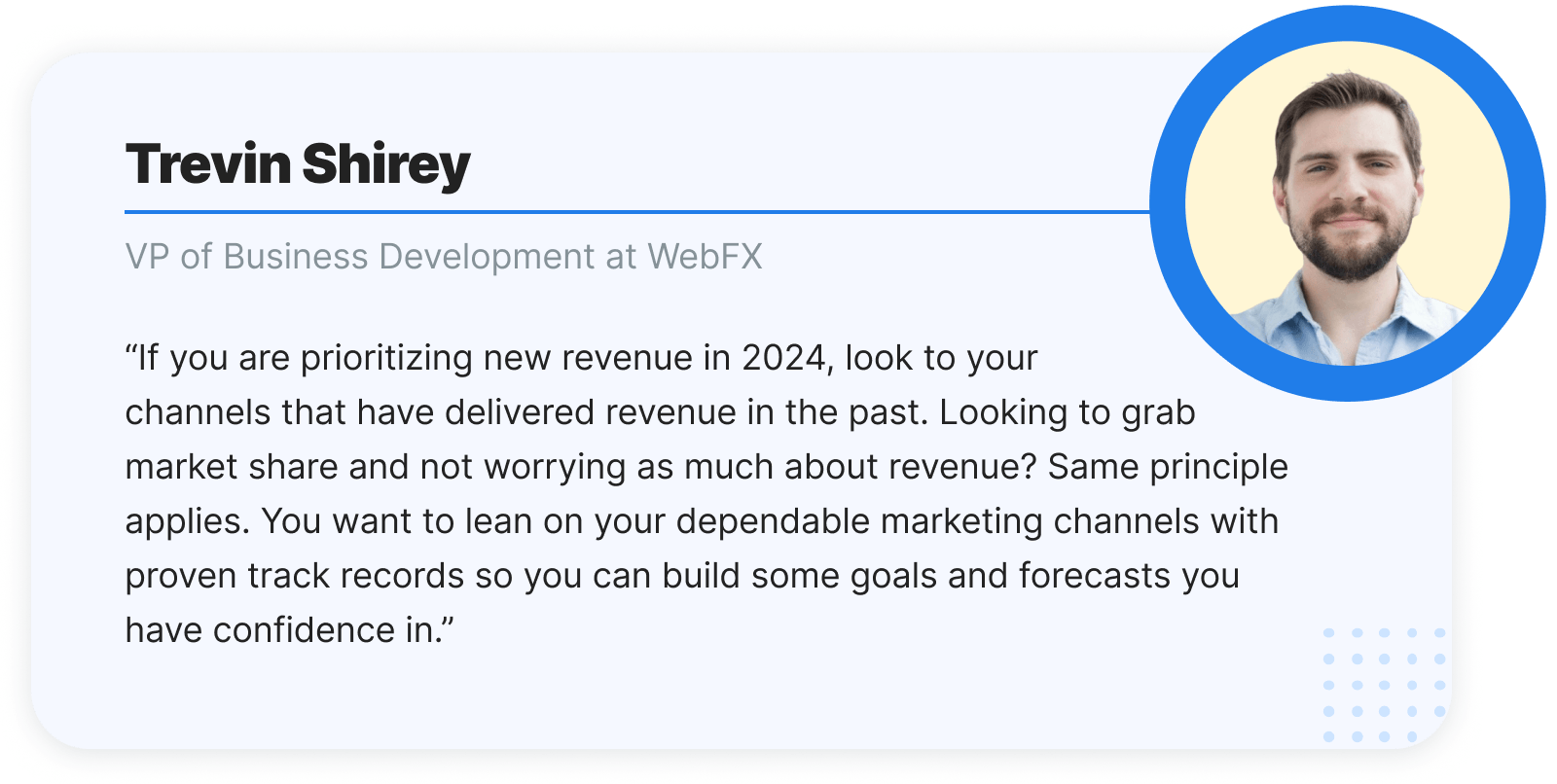
Work backward from your overall company goals and let those dictate where the majority of your marketing budget should go.
If you are prioritizing new revenue in 2024, look to your channels that have delivered revenue in the past. Looking to grab market share and not worrying as much about revenue? Same principle applies. You want to lean on your dependable marketing channels with proven track records so you can build some goals and forecasts you have confidence in.
Trevin Shirey, WebFX’s Vice President of Business Development
Source data:
Top 2024 Digital Channels by Spend % of Respondents
Paid search marketing (Google) 42.40%
Social media (paid ads) 40.00%
Web design and development 32.00%
Social media (organic) 36.00%
Email marketing 29.80%
Search engine optimization (SEO) 29.40%
Video marketing 27.40%
Content marketing 24.60%
Influencer marketing 23.40%
Other 6.80%
Monthly digital marketing spend
Digging deeper, we asked respondents about their projected monthly digital marketing budget for 2024. Here’s what they had to say:
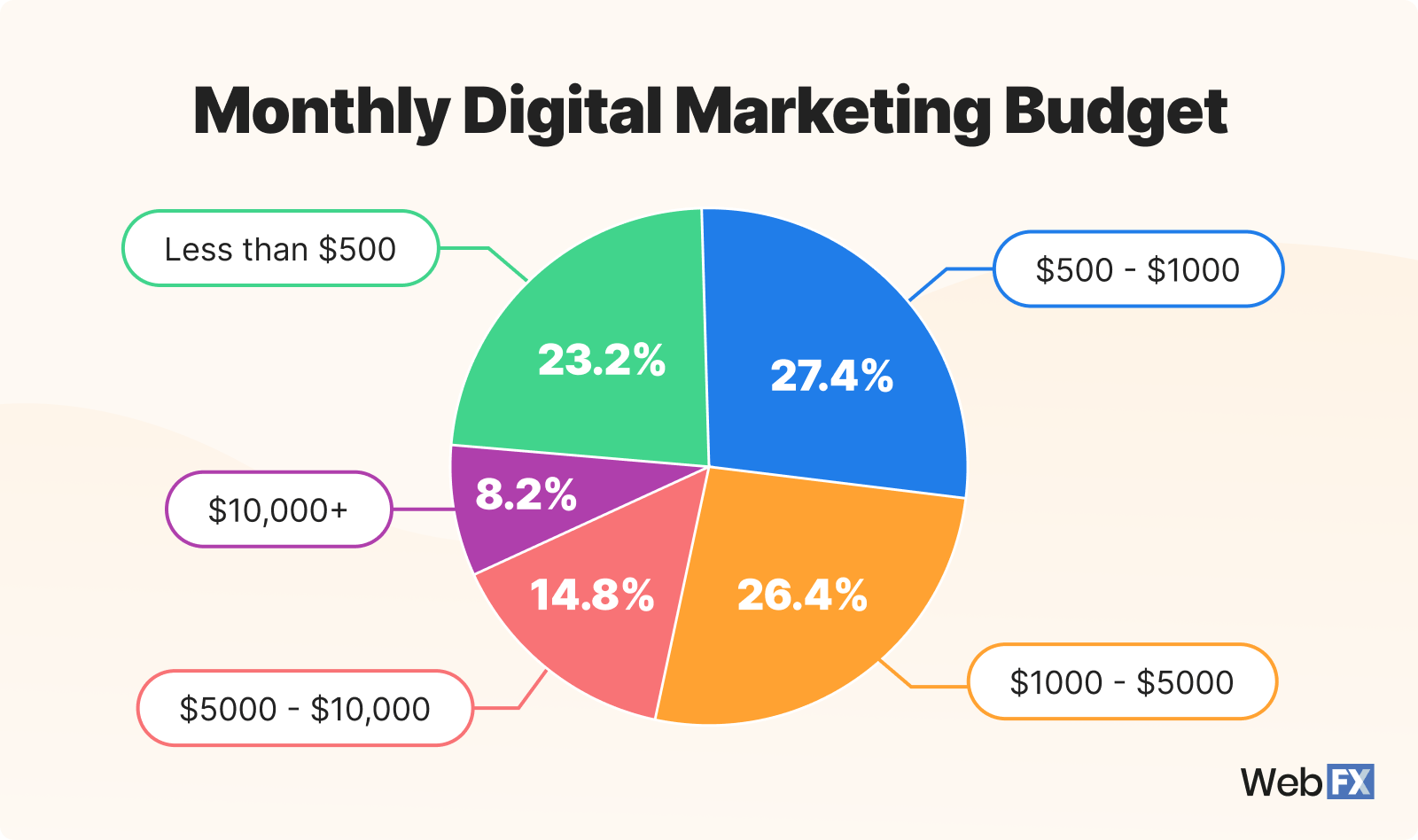
What does this mean?
With over half of our respondents indicating they’ll be allocating $500–$5000 for their monthly digital marketing efforts, it’s evident business leaders are giving themselves some wiggle room with their spending.
For businesses with extra spend, Trevin advises diving beyond tried-and-true strategies:

I always recommend investing 10-15% of your marketing budget into new channels. Many companies overly focus on the channels that have worked well for them in the past and don’t develop enough new marketing channels that might work even better.
Be bold with 10-15% of your budget and try some new things so you’re able to find and develop more long-term channels that are valuable for your business.
Source data:
Monthly Digital Marketing Investment % of Respondents
Less than $500 23.20%
$500 – $1000 27.40%
$1000 – $5000 26.40%
$5000 – $10,000 14.80%
$10,000+ 8.20%
2024 vs. 2023 digital marketing investment
Digging deeper into spending and budgets, we asked business leaders how their digital marketing investments for 2024 shape up against their 2023 spending.
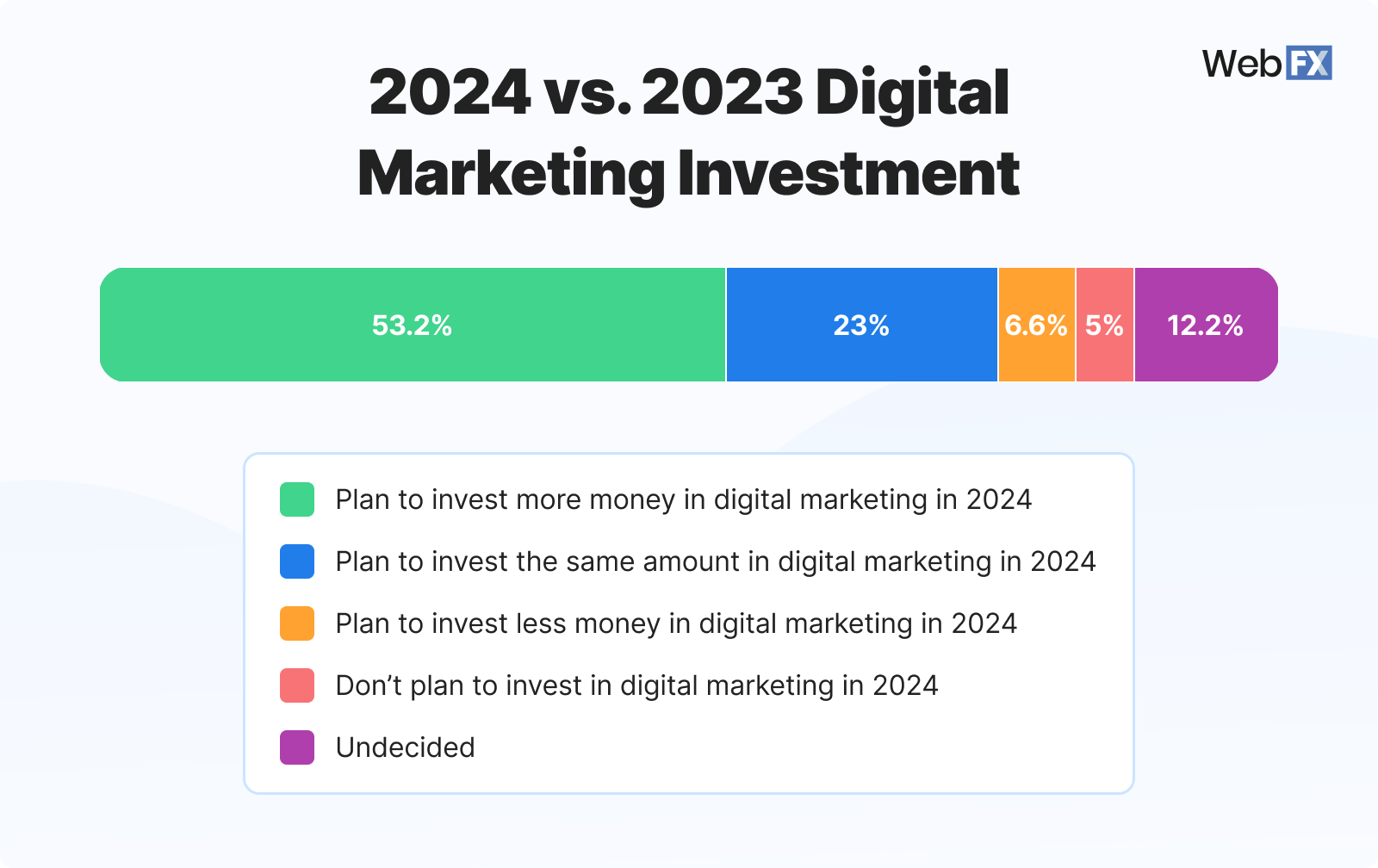
What does this mean?
With economic uncertainty ever-present in 2023, it’s exciting (and encouraging) to see that 53% of business leaders are increasing their digital marketing budgets for 2024.
WebFX’s Lead Sr. Web Strategy Consultant, Dan Varno shared:
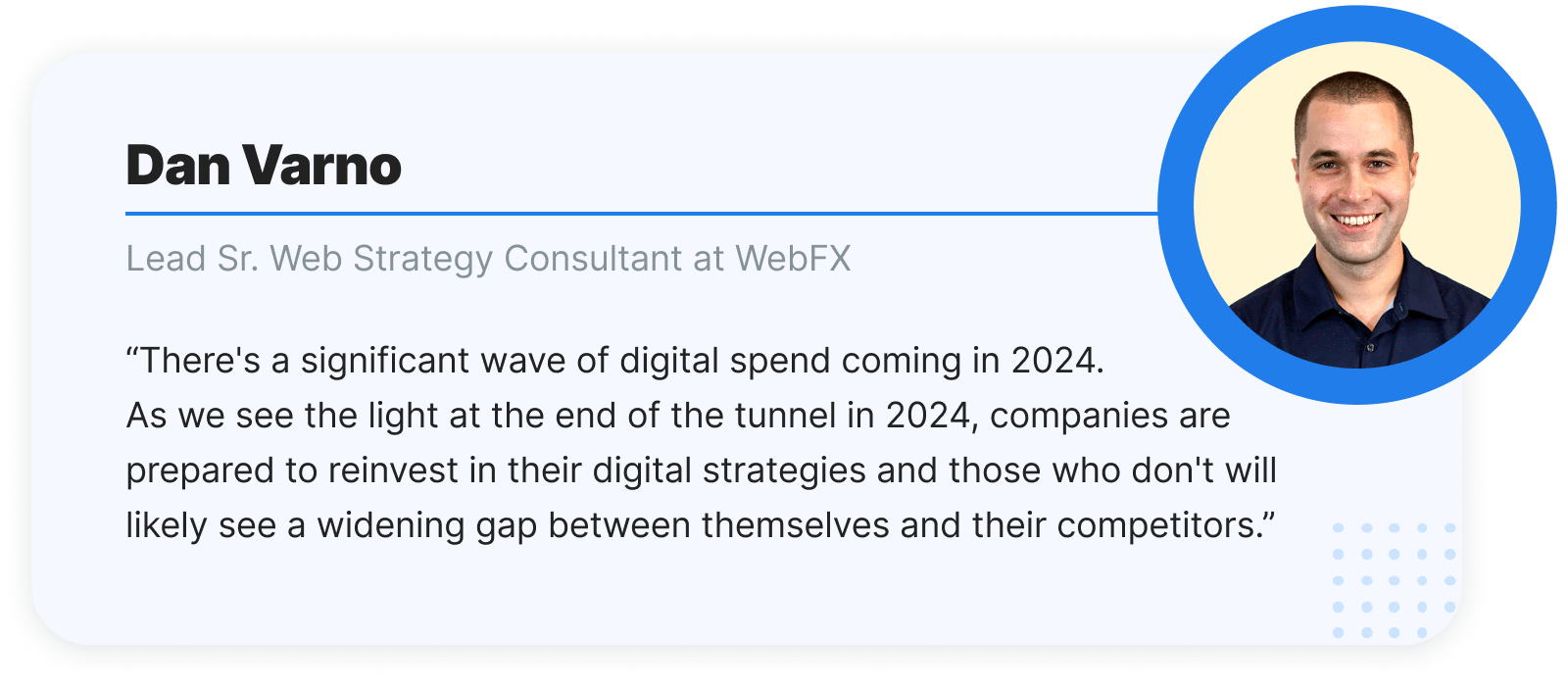
For many, the economic wobble has caused budgets to be frozen, decreased, or allocated to more immediate wins. Many who decreased their digital spend have seen a negative business impact as a result and are eager to correct that.
There’s a significant wave of digital spending coming in 2024. As we see the light at the end of the tunnel in 2024, companies are prepared to reinvest in their digital strategies and those who don’t will likely see a widening gap between themselves and their competitors.
Source data:
2024 vs. 2023 Digital Marketing Investment % of Respondents
Plan to invest more money in digital marketing in 2024 53.20%
Plan to invest the same amount in digital marketing in 2024 23.00%
Plan to invest less money in digital marketing in 2024 6.60%
Don’t plan to invest in digital marketing in 2024 5.00%
Undecided 12.20%
Factors contributing to increased investment
To gain a bit more insight, we asked those business leaders who were increasing their budgets to indicate reasons why they were doing so. Here’s what they had to say:
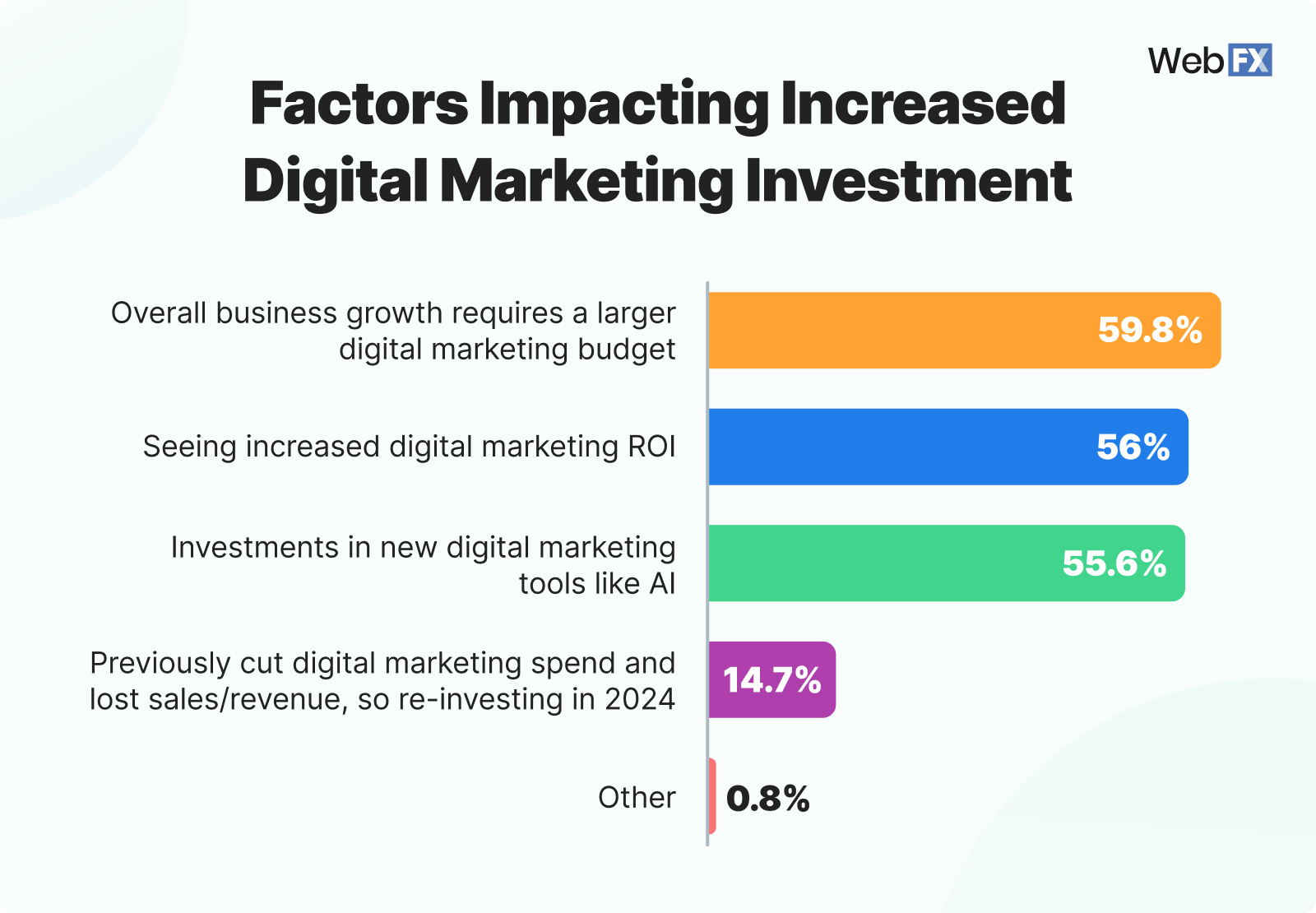
What does this mean?
Despite the economic wobble, 59% of business leaders saw significant business growth in 2023, prompting them to continue their digital marketing without pause in 2024.
Seemingly following Trevin’s earlier advice, 56% of business leaders are investing more money into their digital marketing after seeing an increased return on investment (ROI). Meanwhile, 55% of business leaders are also branching out and investing in new tools and channels like artificial intelligence (AI).
Source data:
Factors Impacting Increased Digital Spend % of Respondents
Overall business growth requires a larger digital marketing budget 59.77%
Seeing increased digital marketing ROI 56.02%
Investments in new digital marketing tools like AI 55.64%
Previously cut digital marketing spend and lost sales/revenue, so re-investing in 2024 14.66%
Other 0.75%
Factors contributing to decreased investment
Next, we asked business leaders who were decreasing their 2024 digital marketing budgets to tell us more about why they were doing so.
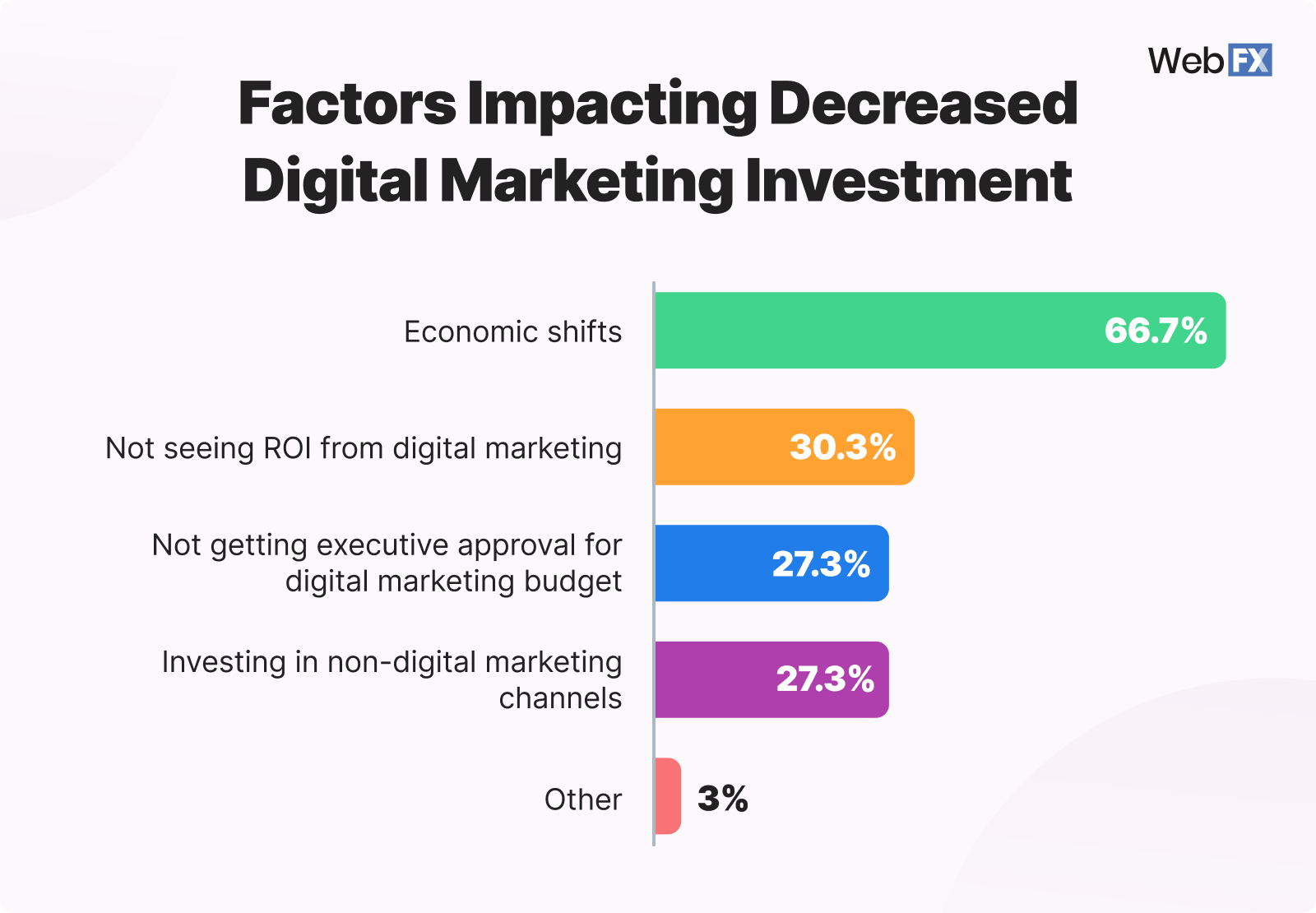
What does this mean?
Unsurprisingly, 66% of business leaders indicated they’re scaling back their 2024 digital marketing budget because of economic shifts and looming uncertainty.
So, with many business leaders scaling up and scaling down in the wake of economic uncertainty, which is the best course of action when planning your 2024 digital marketing budget?
Trevin offered a bit more insight:
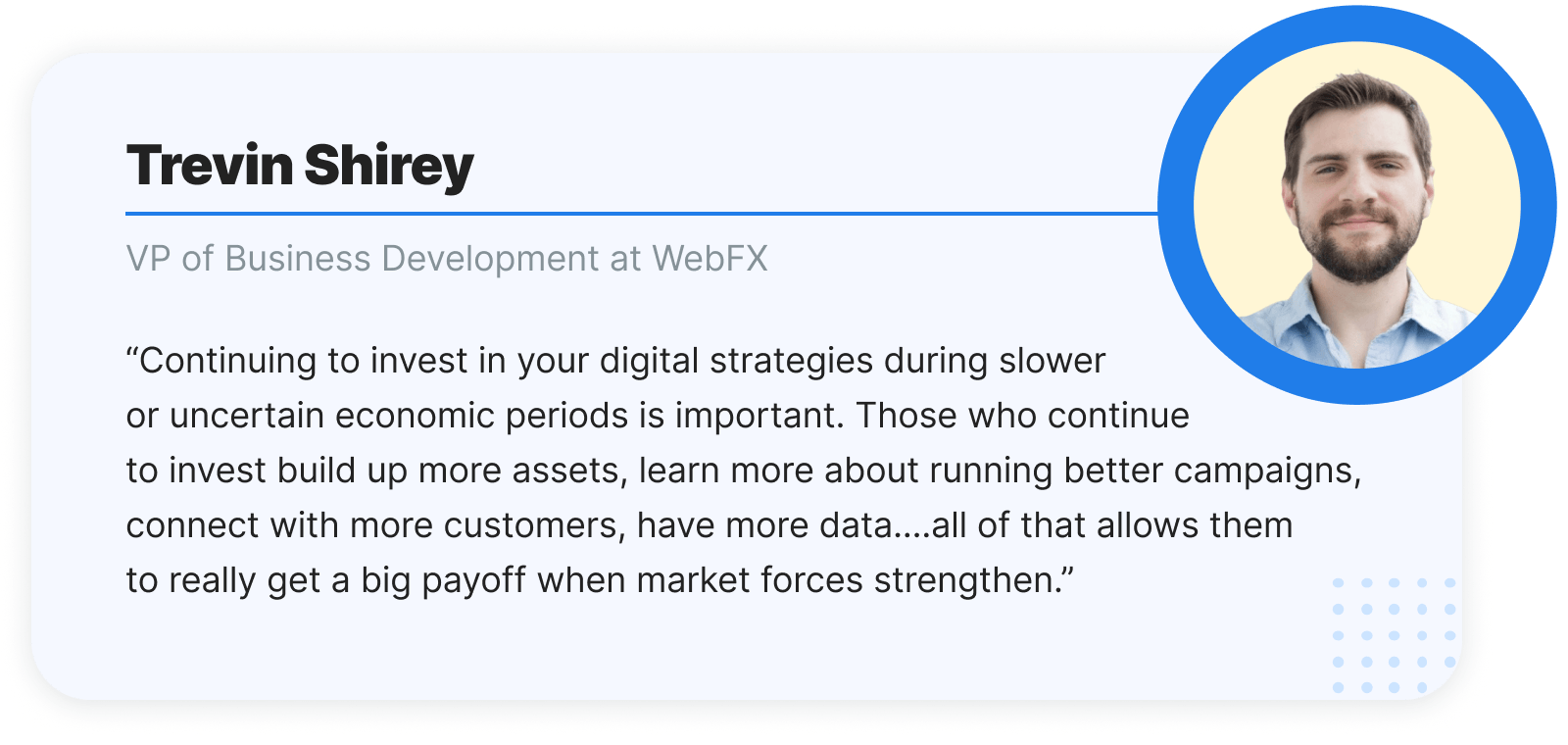
Continuing to invest in your digital strategies during slower or uncertain economic periods is important. Too many companies think you can simply turn your digital efforts on/off and try to wait to time their marketing investment with the market. But that’s challenging to do accurately, and it’s also not effective.
Those who continue to invest build up more assets, learn more about running better campaigns, connect with more customers, have more data… all of that allows them to really get a big payoff when market forces strengthen.
Source data:
Factors Impacting Decreased Digital Spend % of Respondents
Economic shifts 66.67%
Not seeing ROI from digital marketing 30.30%
Not getting executive approval for digital marketing budget 27.27%
Investing in non-digital marketing channels 27.27%
Other 3.03%
Digital marketing providers
Moving on from budget talk, we wanted to learn who business leaders plan to partner with for digital marketing in 2024.
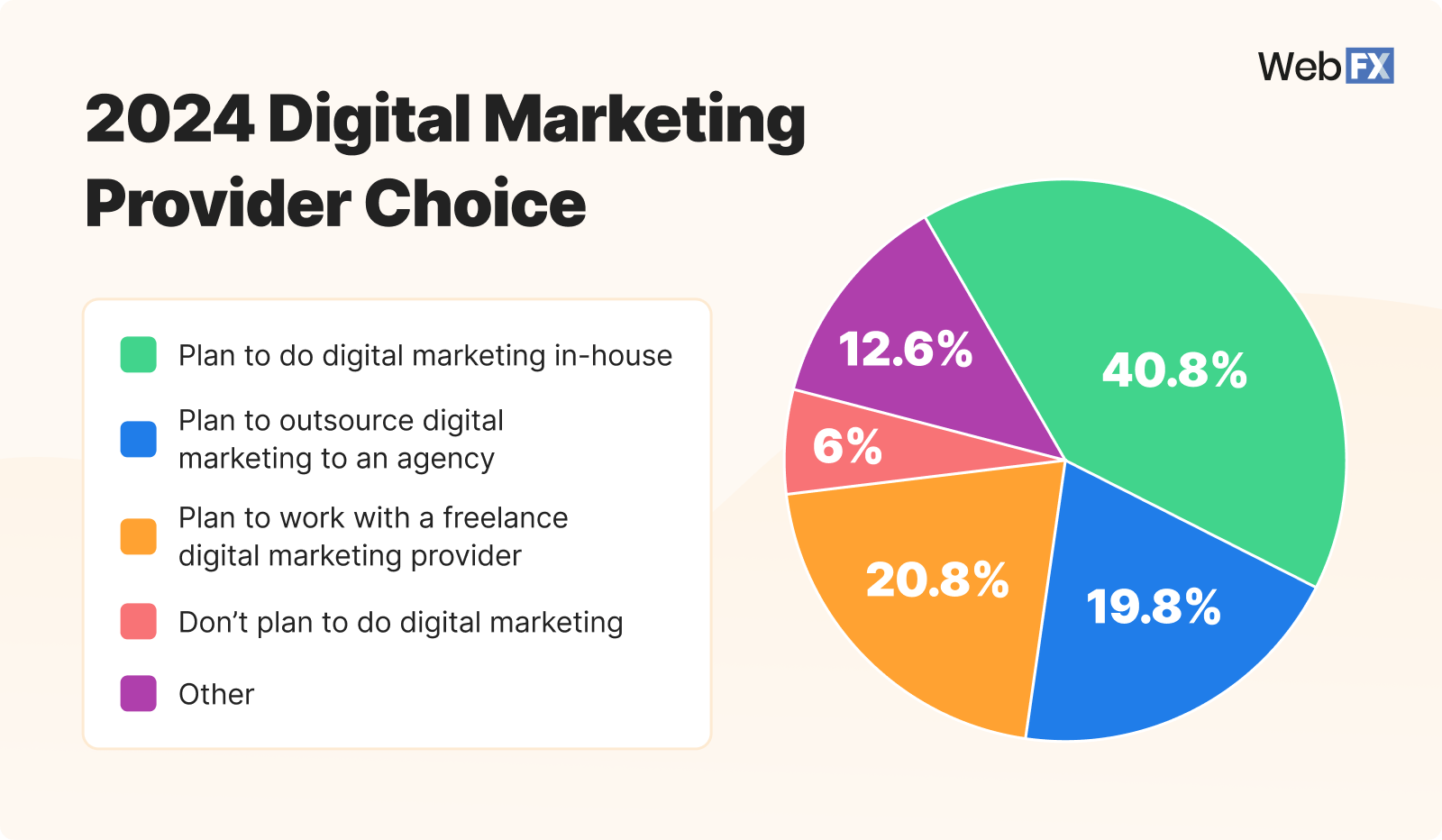
What does this mean?
Surprisingly, 40% of business leaders plan to do marketing in-house, while only 19% plan to outsource their digital marketing to an agency. While in-house marketing may seem like an easier option than outsourcing, it comes with its fair share of challenges.
WebFX Web Strategist Madison Leach explained:

There can definitely be an appeal to in-house marketing, but what a lot of companies don’t realize is the amount of resources it takes to execute a digital strategy in-house. With different channels (SEO, paid search, social media, email, etc.) evolving constantly, it can be difficult for a small marketing team to stay on top of industry trends, not to mention the time it takes to learn each of these approaches and execute them at a high level.
When you work with an agency like WebFX, you get to collaborate with experts across each digital channel, leveraging their years of knowledge and expertise, while also receiving the benefit of the analytics and tech platforms agencies use that would otherwise cost your company tens of thousands of dollars.
Source data:
Choice of Digital Marketing Provider % of Respondents
Plan to do digital marketing in-house 40.80%
Plan to work with a freelance digital marketing provider 20.80%
Plan to outsource digital marketing to an agency 19.80%
Don’t plan to do digital marketing 6.00%
Other 12.60%
Choosing a digital marketing provider
We wanted to dive more into what factors impact business leaders’ choices when choosing to outsource their digital marketing.
Specifically, we asked them which factors influence their choice of a digital marketing provider the most:
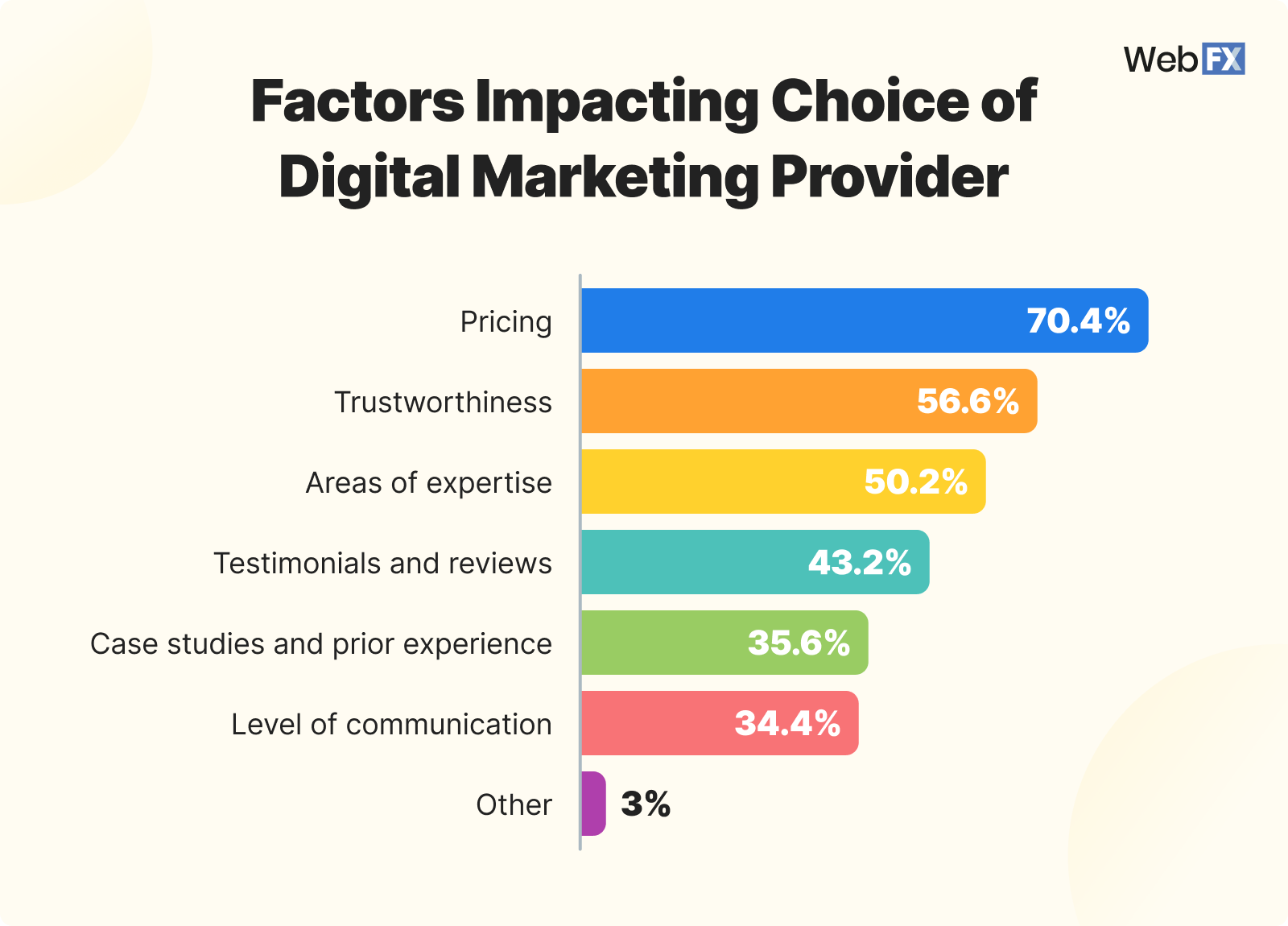
What does this mean?
Trustworthiness (56%) and areas of expertise (50%) stood out as prominent factors, but a whopping 70% of business leaders indicated that price is a top factor when choosing a digital marketing provider.
When choosing to outsource digital marketing, though, it’s important to remember that price shouldn’t be the sole factor driving your decision.
Dan Varno explained:

There’s a ton of downside in picking the wrong digital partner, and over-emphasizing price can lead to a good bit of opportunity cost lost on the other side when not weighing these other factors.
Choosing a company who truly feels like an extension of your team and a strategic partner, while also fitting into a reasonable budget, is typically the right building block for long-term success.
Source data:
Factors Impacting Choice of Digital Marketing Provider % of Respondents
Pricing 70.40%
Trustworthiness 56.60%
Areas of expertise 50.20%
Testimonials and reviews 43.20%
Case studies and prior experience 35.60%
Level of communication 34.40%
Other 3.00%
Top digital marketing goals for 2024
Next, we looked at digital marketing goals business leaders had set for their teams in 2024.
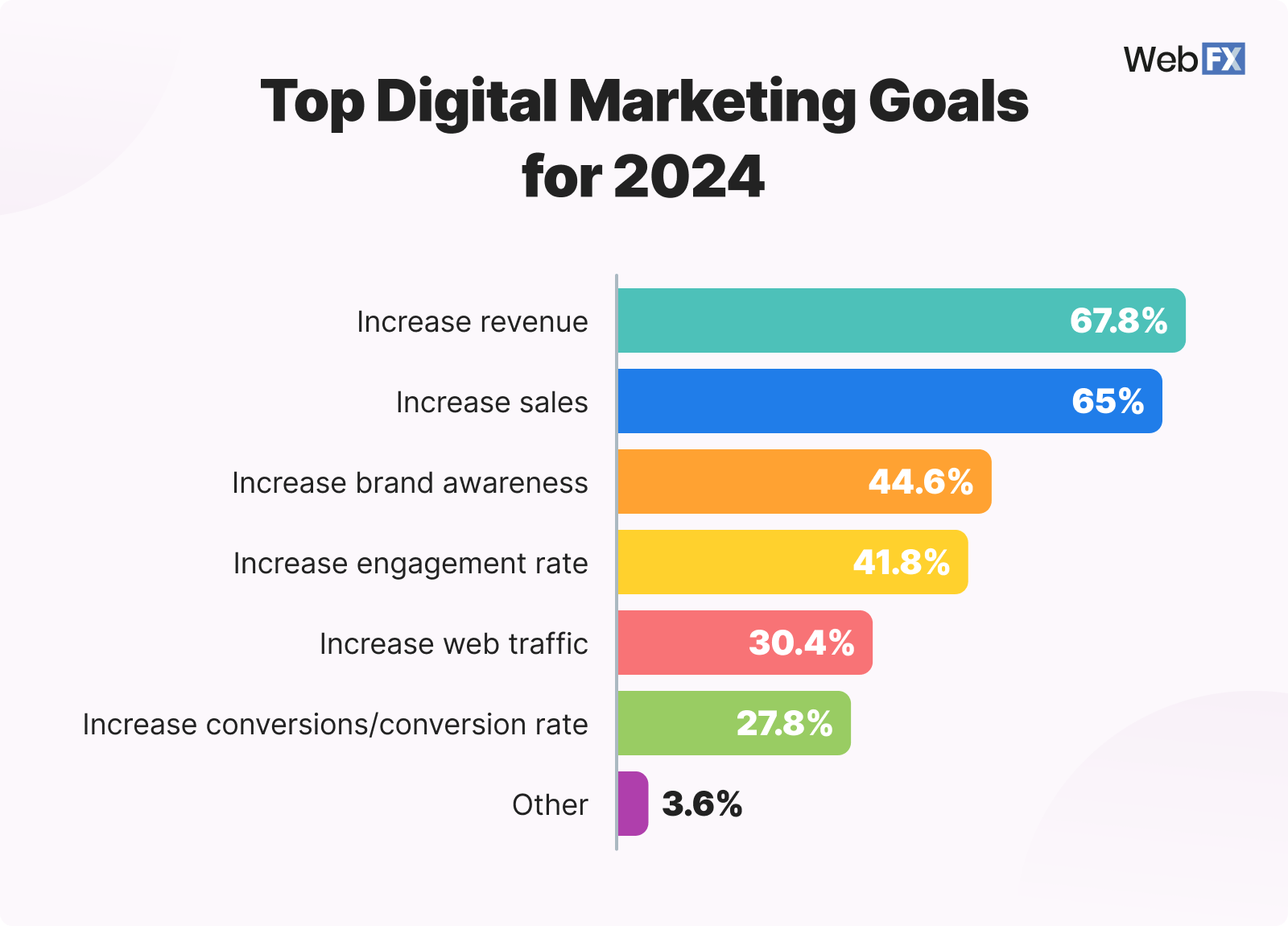
What does this mean?
As the data shows, increasing sales and revenue were the top digital marketing goals for 2024, along with increasing brand awareness and engagement rates.
Strategic goal setting is crucial to developing a successful digital marketing strategy. Whether they’re geared toward improving your bottom line (e.g., increasing sales and revenue) or more exposure-driven (e.g., increasing visibility and awareness), there are certain factors you need to consider.
WebFX Lead Ongoing Strategy Consultant Samm Stengel explains:

Ask yourself, ‘Do we want to prioritize new business prospects to impact my bottom line in the short term, or do I want to prioritize brand visibility and awareness against my competition for the long term?’
Analyzing what is more important to your business structure now and in the future will help with crafting a game plan with your marketing team.
Solidifying both your 1) top priorities and 2) ideal timeline to meet those goals will allow your marketer to consult on the corresponding campaign and channels to drive success. Success is driven by transparent communication between teams of desired outcomes and available resources. This may include getting your financial, marketing, design, and sales teams involved in your go-to-market approach.
Source data:
Top 2024 Digital Marketing Goals % of Respondents
Increase revenue 67.80%
Increase sales 65.00%
Increase brand awareness 44.60%
Increase engagement rate 41.80%
Increase web traffic 30.40%
Increase conversions/conversion rate 27.80%
Other 3.60%
Tracking digital marketing ROI in 2024
It isn’t enough to just set goals — you need to have a plan in place to track your digital marketing results and measure success. So, how are business leaders tracking their digital marketing return on investment (ROI)?
![]()
What does this mean?
Most business leaders are using tools like Google Analytics to keep track of their digital marketing ROI, along with tools like social media dashboards and collecting customer feedback.
While these are adequate ways of measuring results, WebFX Director of Marketing Operations Dan Shaffer warns that relying solely on these tools won’t help you see the bigger picture.

My biggest concern with these results is that it comes down to one question. Is the data they are using for ROI tracking accurate? Direct customer feedback likely doesn’t give you the entire story. CRM software can be subject to inconsistent data from sales teams. Google Analytics can be sampling your data or worse yet, installed incorrectly on your website.
It’s hard, I know, but in a perfect world, you are able to connect every touchpoint from every marketing system back to one event-driven platform. That way you can follow your customer from discovery to purchase, allowing you to optimize bottlenecks in your marketing funnel and invest more where you see a positive ROI.
So, with Dan’s advice in mind, how can business leaders see the bigger picture within their marketing data and monitor customer touchpoints accurately?
The answer: Adopting marketing technology, or martech.
Source data:
Top ROI Tracking Tools Used % of Respondents
Google Analytics 54.80%
Social media dashboards 38.80%
Direct customer feedback and interactions 36.80%
CRM software 34.60%
Reporting from digital marketing provider 25.20%
Custom tech stack 16.80%
Other 4.80%
Martech stack adoption
New and advanced martech is emerging every day, but are businesses taking advantage of this tech? We asked, and here are the results:
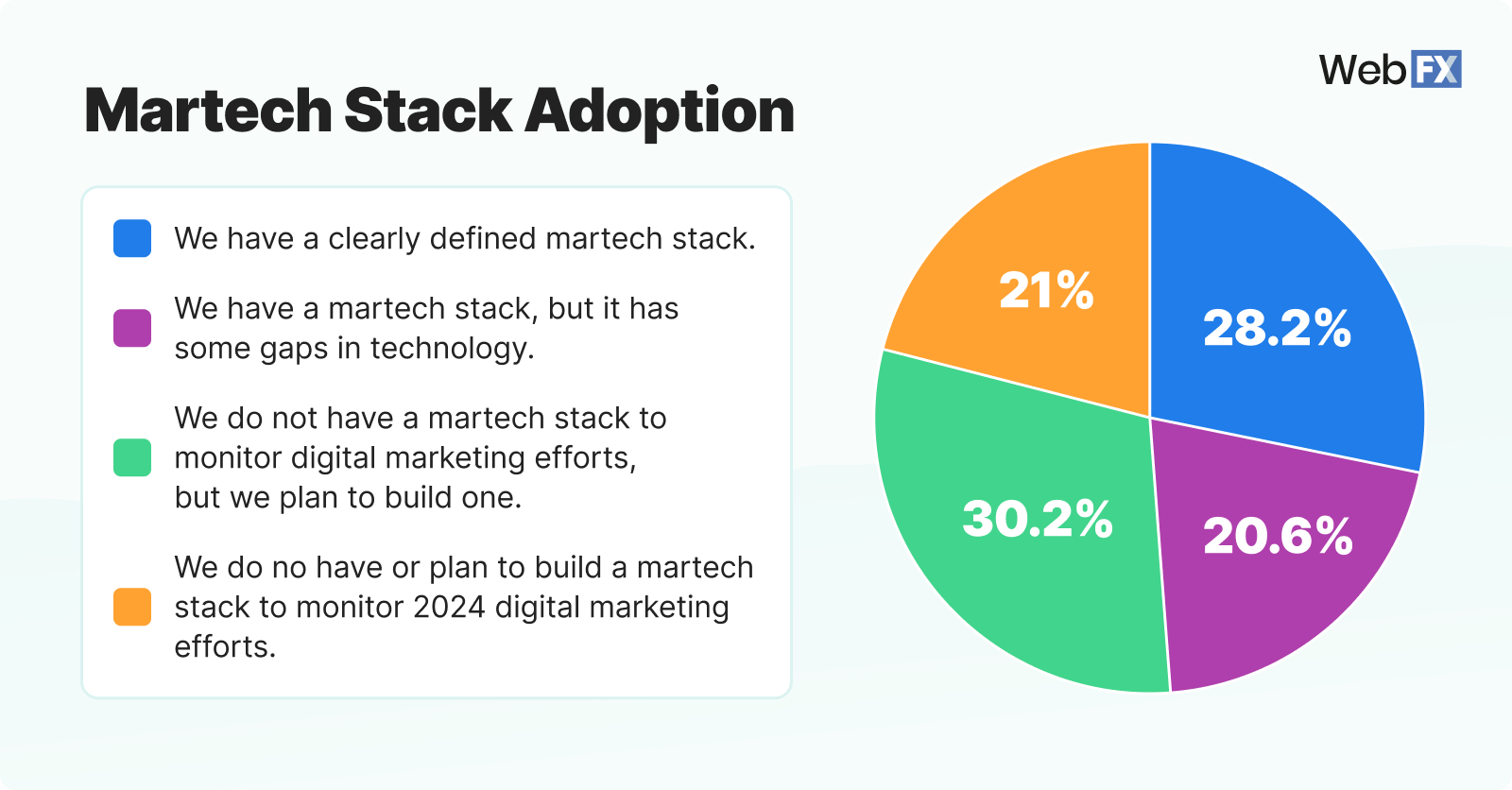
What does this mean?
The good news: 48% of business leaders have a martech stack, or group of marketing software that monitors major areas of marketing, in place.
The bad news: Most business leaders don’t have one in place yet, or aren’t planning on building one at all.
If you’re one of the many who haven’t built a martech stack for your business, check out what
Dan has to say about the benefits of a well-defined martech stack:

Any insights into how your customers are finding you are well worth the effort to surface, no matter what tool they come from. However, the more advanced your marketing strategy becomes, the more places you have to find these insights.
Proper attribution and ROI tracking has to consider the full customer journey which can’t be found in just one of the tools listed above. Instead, if all your tools talk to each other using the first-party data you can collect in your tech stack, you can tie it all back to the touchpoints that matter most for your customer base. Only then, can you get a true outlook on your digital marketing ROI!
Source data:
Martech Stack Adoption % of Respondents
We do not have a martech stack to monitor digital marketing efforts, but we plan to build one. 30.20%
We have a clearly defined martech stack. 28.20%
We have a martech stack, but it has some gaps in technology. 20.60%
We do not have or plan to build a martech stack to monitor 2024 digital marketing efforts. 21.00%
Get ahead on your 2024 goals with WebFX
Planning a digital marketing strategy shouldn’t be left until the last minute. Partner with WebFX, a full-service digital marketing agency with over 28 years of experience in helping businesses implement data-driven digital marketing strategies!
Whether you need expert insights from our team of 500+ digital marketers or want to start building your martech stack, WebFX can help craft a personalized solution that fits your unique marketing needs.
Don’t wait until 2024 — launch your next digital marketing campaign today with WebFX by giving us a call at 888-601-5359 or contact us online to learn more about why we’re a digital marketing agency trusted by 2,000+ clients!
-
 Savannah is a content marketer with editorial experience spanning several businesses. Specializing in social media and marketing trends, she loves talking about the latest developments in online marketing. When she’s not writing, Savannah loves traveling, hoarding books and coffee mugs, and adoring her cat. Please don’t ask her about famous true crime cases, or else she’ll tell you all about her theories and get absolutely no work done.
Savannah is a content marketer with editorial experience spanning several businesses. Specializing in social media and marketing trends, she loves talking about the latest developments in online marketing. When she’s not writing, Savannah loves traveling, hoarding books and coffee mugs, and adoring her cat. Please don’t ask her about famous true crime cases, or else she’ll tell you all about her theories and get absolutely no work done. -

WebFX is a full-service marketing agency with 1,100+ client reviews and a 4.9-star rating on Clutch! Find out how our expert team and revenue-accelerating tech can drive results for you! Learn more
Try our free Marketing Calculator
Craft a tailored online marketing strategy! Utilize our free Internet marketing calculator for a custom plan based on your location, reach, timeframe, and budget.
Plan Your Marketing Budget
Table of Contents
- 2024 Digital Marketing Investment
- Top Channels by Spend
- Monthly Digital Marketing Spend
- 2024 vs. 2023 Digital Marketing Investment
- Factors Contributing to Increased Investment
- Factors Contributing to Decreased Investment
- Digital Marketing Providers
- Choosing a Digital Marketing Provider
- Top Digital Marketing Goals for 2024
- Tracking Digital Marketing ROI in 2024
- Martech Stack Adoption
- Get Ahead on Your 2024 Goals with WebFX

Maximize Your Marketing ROI
Claim your free eBook packed with proven strategies to boost your marketing efforts.
Get the GuideTry our free Marketing Calculator
Craft a tailored online marketing strategy! Utilize our free Internet marketing calculator for a custom plan based on your location, reach, timeframe, and budget.
Plan Your Marketing Budget





